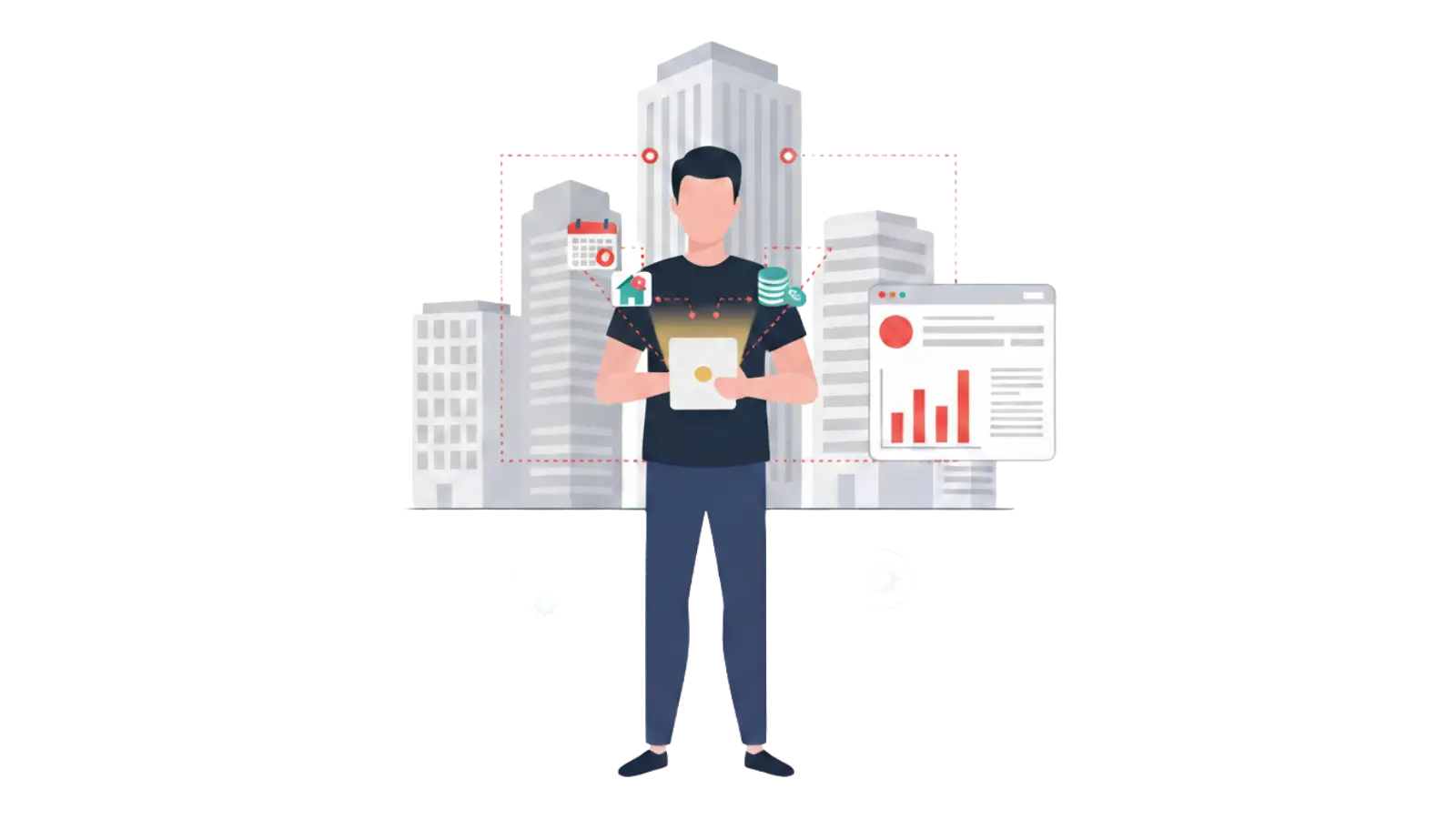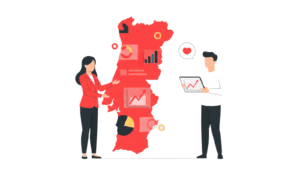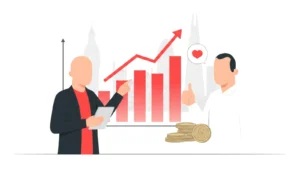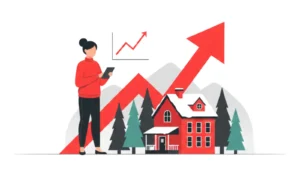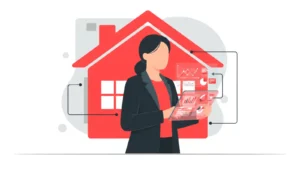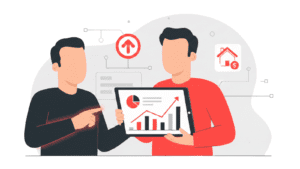Table of Contents
Updated : Dec 26, 2025
In 2025, the global property management software market is projected to reach about USD 6 billion, growing at a CAGR of nearly 9.6%. That’s not just a number; it signals how essential digital tools have become in real estate and hospitality.
Here’s the thing: running a vacation rental today isn’t just “list it and hope.” You’re juggling multiple booking platforms, guest messages, cleaning schedules, pricing strategies, and financials, often all at once. Miss one detail and you’re risking overbookings, poor reviews, or revenue leaks.
That’s where property management software comes in. It’s the backbone that connects everything: bookings, communications, automation, and reporting. The right software doesn’t just keep you organized, it gives you freedom, clarity, and leverage.
In this article, you’ll learn how to evaluate and choose the best property management software for 2025, what features matter, technical criteria to check, and a structured approach for deciding. At the end, I’ll walk you through why Hostaway fits exceptionally well for Airbnb hosts and small to mid-size property managers.
What Property Management Software Actually Does
Property management software is basically the command center of a vacation rental business. It’s where all the moving parts, bookings, guest communication, payments, cleaning schedules, and reports all come together in one place.
For vacation rental hosts and property managers, this means less time switching between apps and more time focusing on guests. Instead of juggling spreadsheets, email threads, and platform logins, you can handle everything from one dashboard that stays synced across all your booking channels.
At its core, property management software simplifies your day-to-day operations. It automatically updates calendars, sends guest messages, processes payments, and keeps all your property data organized. Tasks that once took hours now happen in the background, reducing human error and giving you a clear view of how your business is performing.
And here’s the thing, this kind of software isn’t just for big teams anymore. Even single-property hosts are using automation to save time, stay competitiv,e and manage pricing more strategically. When your property management system connects with dynamic pricing tools like PriceLabs, it becomes even more powerful. You receive real-time pricing recommendations based on demand, seasonality, and local events, allowing you to make smarter revenue decisions without lifting a finger.
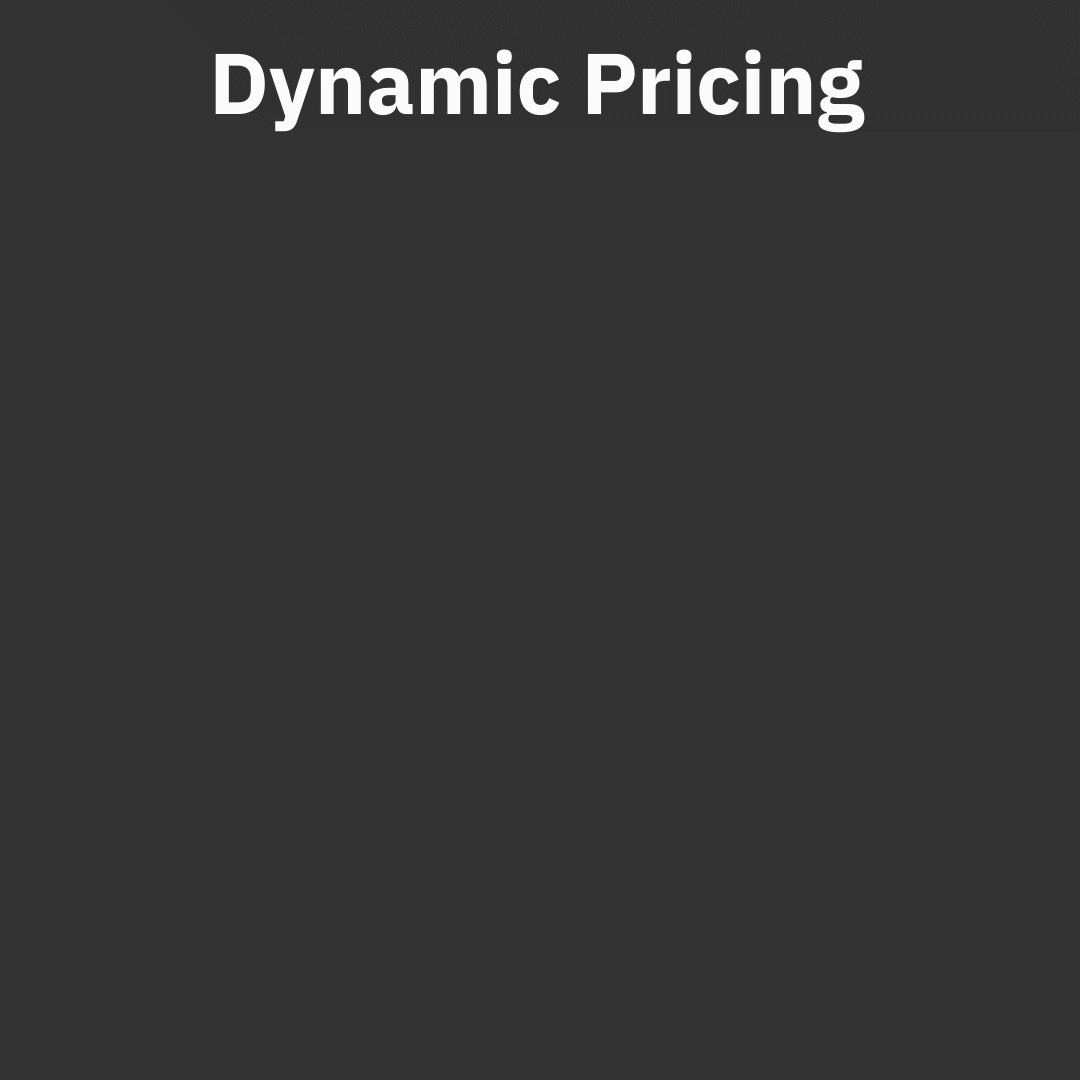
In short, property management software helps you run a more efficient, profitable, and stress-free vacation rental business, no matter your portfolio size
Core Features Every Property Management Software Should Have
Every host or property manager wants software that actually makes life easier, not more complicated. The best property management software keeps your daily operations tight, automated, and error-free, all while giving you back the hours you’d otherwise spend firefighting. Here are the key features you should look for.
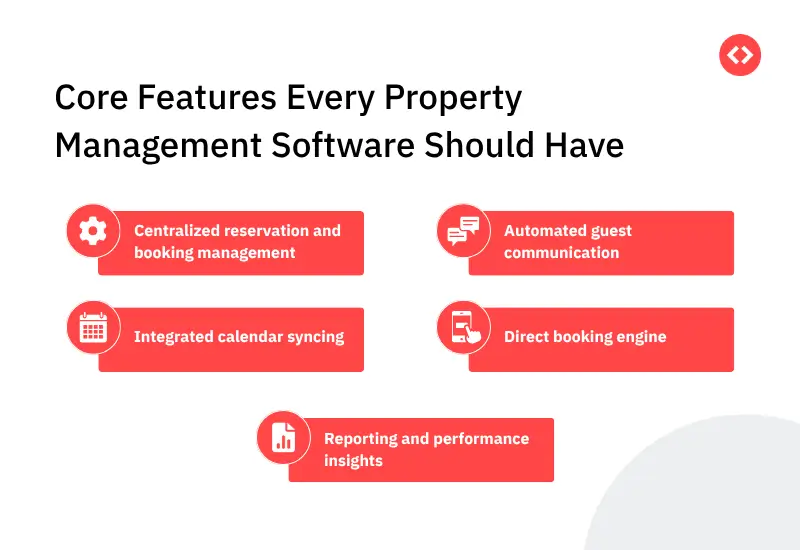
1. Centralized reservation and booking management
This is the foundation of any good system. It should pull all your bookings from all your sales channels into a single dashboard. That way, you can see what’s confirmed, pending, or blocked off without logging into multiple platforms.
For example, if a guest books through Airbnb, your system instantly updates availability across all your listings, no spreadsheets, no guesswork.
2. Automated guest communication
Guest messaging can take up more time than most hosts realize. Property management software automates key parts of the process from pre-arrival check-in details to post-stay review requests.
The best tools let you personalize templates with the guest’s name, stay dates, or property details so messages still feel warm and human. This helps you stay responsive and professional, even during high season when your inbox is overflowing.
3. Integrated calendar syncing
Few things create more stress than double bookings. A strong property management platform keeps all your calendars synced in real time, so when a property is booked, it updates across every connected channel instantly.
This isn’t just about convenience, it protects your reputation. When guests see accurate availability and reliable hosts, they’re more likely to book again.
4. Direct booking engine
If you’re only relying on OTAs like Airbnb or Vrbo, you’re giving up a slice of your revenue to commission fees. A built-in direct booking engine lets guests book commission-free through your website.
This also helps you build your brand, nurture repeat guests, and create more control over your business. For instance, you can offer returning guests a loyalty discount or promote special offers during slower seasons, something OTAs don’t allow you to do easily.
5. Reporting and performance insights
Property management isn’t just about keeping things organized; it’s about understanding what’s working. The right software gives you access to detailed reports on occupancy, revenue, cancellations, and average daily rate.
These insights help you identify trends and fine-tune your strategy. For example, if your summer occupancy drops, you can quickly connect your system to a pricing tool like PriceLabs to optimize your rates and attract more bookings.
Tools That Drive Efficiency and Growth
Once you’ve covered the basics, it’s worth looking at the features that separate good property management software from great ones. These advanced tools are what help you grow, reduce manual work and keep your business running smoothly even as your portfolio expands.
Task management
Running multiple properties means juggling cleaning schedules, maintenance requests, and last-minute repairs. A strong property management system gives you a built-in task management tool to keep everyone aligned.
You can assign cleaning tasks automatically after each checkout, monitor progress in real time, and get notified when a job’s complete. It’s the kind of visibility that keeps turnovers on schedule and guests consistently impressed.
Dynamic pricing integration
Pricing is one of the most powerful levers for profitability and one of the trickiest to manage manually. That’s where dynamic pricing tools like PriceLabs come in. When your property management software integrates directly with PriceLabs, you can automatically adjust nightly rates based on demand, seasonality, and local events.
The result? Smarter pricing, higher occupancy and more revenue, all without constant monitoring. It’s a simple but impactful upgrade that turns pricing into a strategic advantage.
Automation and AI
Automation used to mean just auto-messages and reminders. In 2025, it’s smarter than that. Modern systems now use AI to learn from your operations, helping you automate guest communication, streamline content, or even optimize SEO for your direct booking website. It’s like having an extra set of hands running behind the scenes, managing repetitive tasks so you can focus on guest experience and growth.
Integrations that keep everything connected
Property management software doesn’t work in isolation; it thrives when connected. Look for platforms that integrate seamlessly with tools you already use: smart locks, payment processors, accounting systems, or marketing apps.
This ecosystem approach helps your tech stack “talk” to each other, reducing friction and keeping everything automatically up to date.
Scalability
Finally, the best systems grow with you. Whether you manage three properties or three hundred, your software should be able to handle more listings, more users, and more automation without slowing down or requiring a significant rebuild. Scalability is what turns short-term wins into long-term stability.
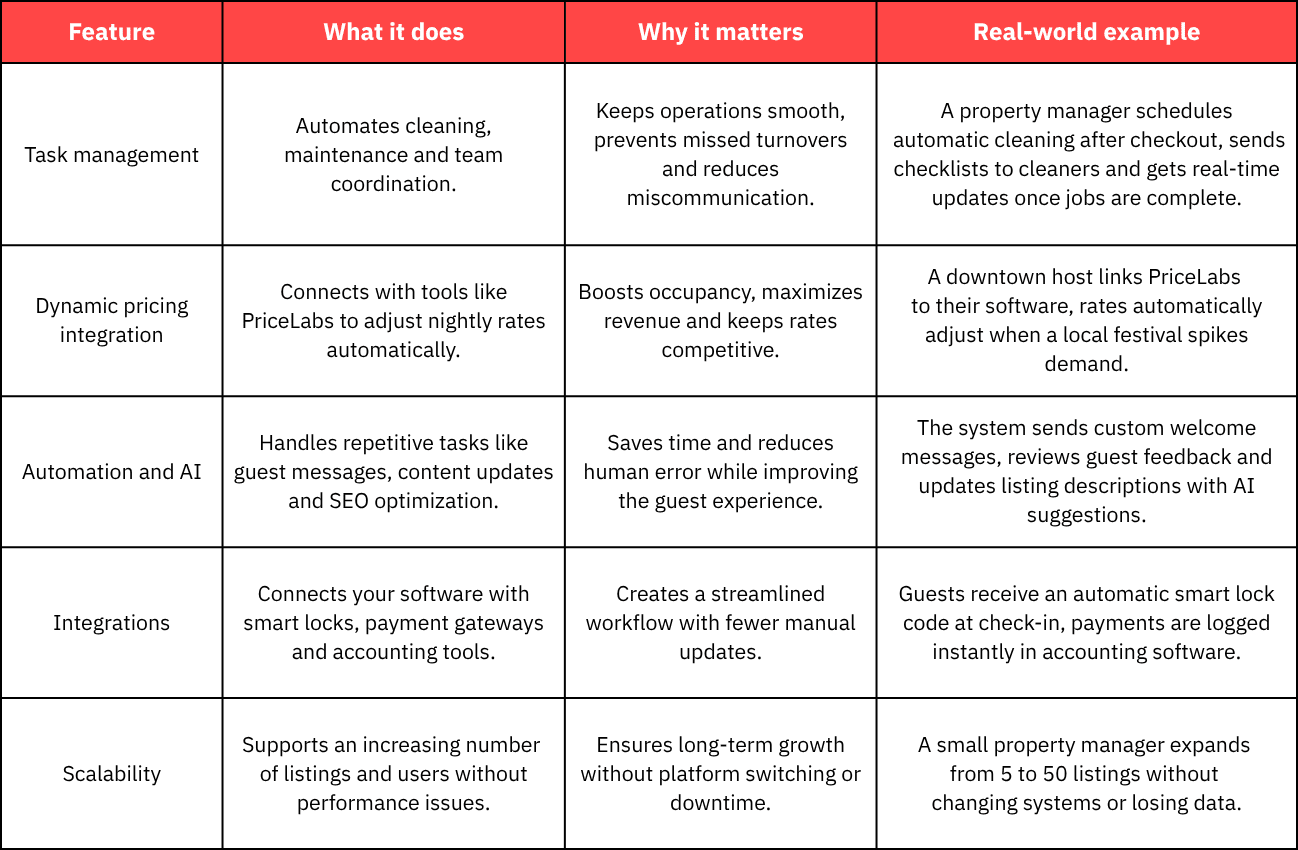
Technical Considerations: What to Check Before You Commit
Once you’ve narrowed down your options, it’s time to look under the hood. The best property management software isn’t just about features, it’s about performance, security and long-term reliability. Here’s what to check before you make a decision.
Reliability
Your software should run smoothly no matter how busy things get. Even a short outage can mean missed bookings or double charges. Look for providers with transparent uptime data and a reputation for stability. A reliable system keeps your reservations, messages, and payments running even during peak season.
Security
Handling guest data and payments comes with real responsibility. Choose software that uses encryption, complies with payment standards, and protects sensitive information. This builds trust with guests and safeguards your business against costly breaches.
Scalability
Your tech should grow with you, not hold you back. Whether you’re managing five listings or fifty, your property management software should handle more data, more users, and more integrations without slowing down. Scalability means you won’t have to migrate systems every time your business expands.
User experience
If it takes weeks to figure out how to use it, it’s not worth it. Look for intuitive dashboards, clean navigation, and mobile accessibility. A well-designed interface reduces training time and makes day-to-day management faster, especially when you’re on the move.
Onboarding and support
Even the most innovative software needs strong support. Check what kind of onboarding the provider offers and whether help is available 24/7. Responsive support, ideally from real humans rather than chatbots, makes a huge difference when something unexpected happens.
Key Factors to Consider When Evaluating Property Management Software
Once you’ve reviewed the features and technical specs, the final step is to find the right fit for your business. The goal isn’t just to pick a system that works; it’s to choose one that fits how you actually operate day to day.
Define your needs
Start with what matters most to your workflow. Do you need advanced automation? Strong channel management? Cleaner coordination? Listing out your must-haves keeps you from getting distracted by flashy extras you’ll never use.
Test usability
You’ll know within minutes if the software feels right. Take advantage of free demos or trial versions to see how intuitive the interface really is. The best platforms feel natural to navigate, no manual required.
Check integrations
Your property management software should integrate easily with tools you already use, such as PriceLabs for dynamic pricing. Seamless integration means fewer manual updates and more time saved.
Evaluate scalability
Even if you’re managing a small portfolio now, choose software that can grow with you. As your business expands, your platform should handle new listings, staff, and integrations without slowing down.
Assess pricing
Pricing structures vary widely. Some charge a monthly subscription, others take a percentage of each booking. Make sure you understand what’s included, what’s extra, and whether the total cost makes sense for your business model.
Read reviews
Before committing, look at feedback from real property managers. Reviews often reveal what long-term use feels like, from customer support quality to how updates usually roll out. Peer insights can highlight strengths (and red flags) you won’t find on a sales page.

Why Hostaway is the Best Property Management Software for 2025
After weighing all the features, integrations, and technical details, one platform consistently checks every box for professional hosts and property managers: Hostaway.
What makes Hostaway stand out isn’t just its features, but how everything connects seamlessly in one system. It combines property management, channel management, automation, and dynamic pricing integrations so you can manage bookings, optimize rates, and run operations from a single hub.
Hostaway has also been leading the charge with AI-driven tools. From automating guest communication to helping hosts streamline listing content and SEO tasks, these innovations save time and boost efficiency without needing extra add-ons.
Beyond the tech, Hostaway empowers hosts to take control of their business with a direct booking website builder, giving them a way to reduce OTA dependency and build their own brand.
And when it comes to support, Hostaway delivers what most platforms don’t: 24/7 access to real people, with no hidden fees or premium tiers. It’s the kind of reliability that matters when you’re managing properties across time zones.
Finally, Hostaway’s scalability makes it a fit for every stage of growth. Whether you’re an independent host or managing dozens of listings, the system expands with you no migration headaches or performance drops.
Hostaway stands out for its balance of power, reliability and innovation, helping property managers focus less on logistics and more on growth.
Frequently Asked Questions
1. Is property management software worth it if I only manage a few rentals?
Absolutely. Even with just one or two properties, automation saves you hours each week, especially during busy seasons. It also reduces human error, improves response times and gives your guests a more professional experience. Think of it as setting up a system that grows with you rather than something you “outgrow.”
2. What’s the difference between automation and AI in property management software?
Automation handles repeatable tasks like sending check-in messages or updating calendars. AI, on the other hand, learns from your behavior and data suggesting price adjustments, optimizing guest communication or improving content automatically. Think of automation as the “doer” and AI as the “thinker” working behind the scenes.
3. Should I use a separate channel manager if my property management software already has one built in?
Not always. If your software offers a reliable, API-connected channel manager that syncs with Airbnb, Vrbo and Booking.com, a separate one usually isn’t necessary. However, if you’re managing listings across niche or regional sites, it might make sense to use an additional solution for better coverage.
4. What’s one mistake property managers make when choosing software?
Focusing too much on price and not enough on fit. The cheapest software often lacks the integrations or scalability you’ll need later. A good rule of thumb: choose the platform that solves your biggest pain points now and supports your future goals, even if it’s not the lowest monthly cost.
5. How does dynamic pricing software like PriceLabs fit into property management?
Dynamic pricing tools specialize in maximizing your revenue by adjusting rates daily based on market data, local events and demand patterns. When your property management software integrates directly with a tool like PriceLabs, you get the best of both worlds: automated operations and optimized pricing that keeps your listings competitive year-round.

